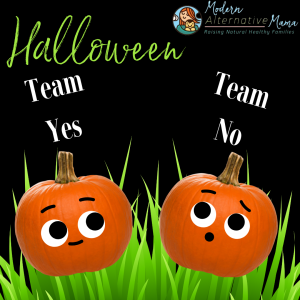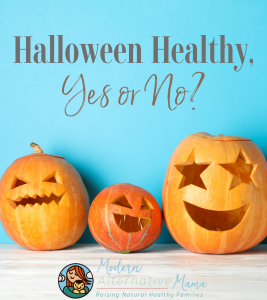By Contributing Writers: Lindsey, Rustina, and Tim
The Halloween Debate
Retail and groceries stores are all-too-happy to drag out their halloween decor and candy stores for the fall season. Like every season before us, social media is all abuzz. Should you let your kids have candy on Halloween? Should you celebrate Halloween? Should you hide the family away for the day?
A few of us decided to come together for this debate, we are sharing our thoughts, joys, fears, and best suggestions for the healthiest October 31st! In MAM fashion, we’re here to explore both sides of the discussion and let you decide what works best for you while offering some yummy and healthy suggestions!
So…Is Halloween Healthy?
Team “Yes”
Many people celebrate Halloween differently and for different reasons.
Maybe you grew up in a family or community that went all out for Halloween. The great memories of excitement and adventure lead you to want to give that experience to your family. Enjoying all the fun of picking out a costume or seeing your child’s creativity bloom while making their own! Huddling together during the haunted houses to get your blood flowing. Laughing your way through pumpkin carving contests and bobbing for apples. Going out for the fun (and great exercise) of running around trick-or-treating. Knocking on doors to meet new people and say hi to ones we know. These all can create an amazing community feeling that can be so therapeutic in our often impersonal, out-of-touch world. For many, this is what Halloween is about.
Like all celebrated events, there is a big commercial side too. Some people love the big “free” candy hauls. Not everyone will gorge on all the candy collected, of course. Some feel it is fine one night a year to do so, and then follow up with a healthy diet and detox to prevent the overwhelmed mind and body afterwards. I mean, have you researched what sugar does to your body? Some may have a few pieces and forget about the rest.
Some people love Halloween for its deep-rooted history. Some (probably the majority) do not care since so many traditions have roots in earlier times and different religions. Celebrating Halloween doesn’t mean the same thing to everyone, just like every other holiday or special time. If people are to disavow all things that may have a past association with paganism and later viewed as evil from another religion, will many things remain? Are we forced to give up all traditions? This debate is not new, and it is not likely to go away. History is important, but the future is also. Finding a balance isn’t always easy.
Team “No”
Those that are opposed to celebrating Halloween typically cite health, safety, the origins of Halloween, or philosophical reasons. Let’s consider some of the concerns that these people might raise.
Some people are struck with the paradox of spending 364 days explaining to their children the importance of limiting or completely eliminating sugar/high fructose corn syrup and 1 day going all over the neighborhood to see how much sugar they can hoard. Why try to just be moderate and let kids collect candy as a celebration or reward? If candy is not supportive of a healthy lifestyle, why would someone make it a thing tied mentally to celebration?
The whole concept of modern Halloween for children is rooted in getting a lot of candy – candy that the entire rest of the year many people would be furious if someone gave to their children (without asking). Candy, that if asked for during the other 364 days of the year, would evoke a long explanation about how those ingredients really hurt our body. It isn’t that sugar is evil, but essentially every type of candy that is handed out on neighborhood porches is full of sugar, dyes, and other ingredients that can be harmful.
Perhaps it is even worse for children who aren’t used to a diet full of processed foods to suddenly have large amounts of sugar and other harmful ingredients introduced into their diet one night a year (or even stretched out a little at a time for a week). The body is always working towards homeostasis, so children that are not accustomed to the typical candy ingredients may struggle more with handling the sugar. Also, children with certain genetic dispositions may have extreme difficulty handling the sugar and/or detoxing out the unnatural ingredients. If your diet is typically devoid of sugar, you may be unaware of your child’s response to these ingredients.
Closely tied to the health concerns that some people have regarding Halloween are the safety concerns. Typically, people do not encourage taking food from strangers, but when trick-or-treating, that is essentially all you do all night. Strangers can also use this night to gain the trust of your children. Situations and people that would typically frighten a child enough to make him or her run away are not only tolerated on Halloween, but celebrated. Children see modeled in front of them for that day that scary things are good and that ignoring that gut feeling to run away and scream is also good. Obviously, this is all done implicitly, but most of the time implicitness is a much more effective teacher than explicitness.
There are plenty of older children, and even adults, that feel they have complete license to scare children on this night (while wearing costumes that completely conceal their identity). Many of these people are emboldened further by alcohol consumption on that night. The decorations, costumes, food, and other things about the night are meant to be scary, but children are encouraged to embrace and celebrate those feelings of fear.
The history of Halloween can also cause concern for some. There are many different theories about which exact celebration Halloween evolved from. For sure there is some connection to various denominations’ celebration of saints. There are also some theories that connect it with a celtic celebrations, and others that connect Halloween with Satanic rituals. Regardless of where exactly Halloween has its origins, it seems clear that Halloween came from some kind or kinds of celebration based on the connection between the living and the dead. Modern Halloween in the United States has little to no celebration of life and seemingly a strong connection to the celebration of death.
Many do not celebrate Halloween for philosophical reasons. It is important for each family to have values and goals based on those values. Many families have values centered around kindness, being a light to others, truth, respect, and other like things. Halloween seems diametrically opposed to these values. Halloween celebrates darkness, scaring people, and making things typically viewed as negative positive.
Many people would find television shows or movies with certain violent, scary, suspenseful, or dark elements inappropriate for children, particularly younger children. However, some of those same people would then go out and participate in celebrating some of these exact same elements on Halloween. For example, you might never allow your 5 year old to watch a movie with someone getting axed in the head, but on Halloween maybe you would allow that 5 year old to wear a costume and do make up that makes it look like they have an ax stuck in their head.
Being opposed to Halloween normally can be summarized by viewing Halloween night as a perversion of goodness and beauty. What normally would be considered bad or tragic is viewed as good. What normally would be considered grotesque or horrifying is considered creative and beautiful. Trick-or-treating becomes a completely immersive experience. Everything is decorated in this way. People are dressed in this way. Food is prepared in this way. Once the scene is set, children become active participants in the night where bad is good and good is boring.
Should you “celebrate” Halloween? The answer: Just Respect Each Other
We live in an amazing amalgamation of cultures in the US. And while we debate a lot about what “should’’ or “shouldn’t” be done, there is also a lot of understanding around different ways to do different things. Including Halloween.
Some people think that because of Halloween’s roots, that if you celebrate Halloween, you’re celebrating a pagan holiday. So they choose not to. That’s ok! We should support people’s rights to do what works for them! Most in the US don’t acknowledge or know about Halloween’s roots. They view it as a day to dress up creatively, scare people, get in the community spirit, or for kids to just have fun. And that’s ok too!
Either way you fall on the matter or whether you land smack dab in the middle, the important thing is to respect each other. There are so many things in this world threatening our children and our health. The last thing we need is more fighting and pointing fingers. We are 3 people with all different views that came together to share our opinions and still find ourselves laughing with each other at the end. THAT is what life is all about!
Respect each other – you can still have your own opinion! You can disagree and still be kind to each other. Just because an argument has been given the social media spotlight special, doesn’t mean we need to be rude to others. We don’t need to lose our civility over all disagreements. Save it for those really big debates – like putting toxins in our food and children!
What can we do to make it healthier? AKA Team Moderation
Moderation is a great option if you want to have the community fun of Halloween with the unsavory health effects.
Some people like to do Switch Witch. This is where all the unhealthier options can be traded-in to the parents for healthier choices or even cash. This lets the enjoyment found in festivities while also showing a benefit for making healthy choices.
Some families go trick or treating on Halloween night, and then let their kids choose a small amount of candy (5 of their favorite, or 5 of the chocolate candy, etc). It can be an opportunity to discuss and experience Halloween while staying mostly healthy.
Others might attend a trick-or-trunk put on by a natural community or church where there isn’t typical candy exchanged, but baked treats or homemade goodies instead.
Here are 10 healthy choices that you could offer at your door or to your kids:
- Fruit Leather
- Blueberry Muffins (Gluten Free instructions too)
- Chocolate Cake
- Pizza Balls
- Zucchini Lemon Poppy Seed Bread
- Puzzles
- Crayons and sketch paper
- Sample-sized Fun Marshmallow Dough
- Popcorn
- Painted rocks



